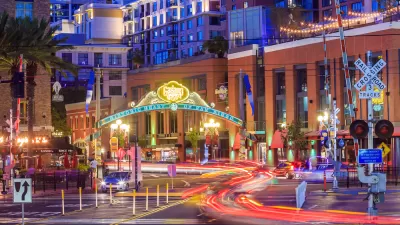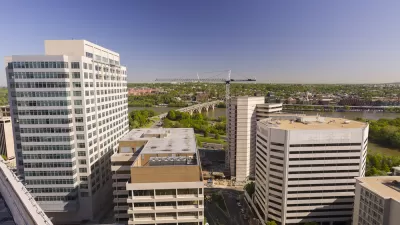Minneapolis took a large leap forward last week by approving a plan that would reduce parking requirements for transit-adjacent developments in a huge swath of the city—not just downtown.

"Buildings with few or no parking spaces can now be built outside downtown Minneapolis as part of a proposal that passed the City Council Friday [July 10, 2015]," reports Eric Roper.
"The measure tackles the city's typical one-spot per-unit parking requirement for new developments by allowing significant reductions near high-frequency transit. The final version was scaled back to allow only a 50 percent reduction for larger buildings, rather than freeing them from the requirement altogether.
"But the final language allows buildings with 50 or fewer units to be built without parking outside of downtown -- where there are already no parking minimums -- if they are a quarter-mile away from transit with 15-minute frequencies."
The article goes on to detail case supporting the reduction of parking requirements. Conspicuously absent are soundbites from politicians or local advocates dissenting from the new ordinance. The article does, however, further detail the compromises that produced the final version of the law. The article also notes that despite new regulatory flexibility, many banks require parking to finance development projects.
FULL STORY: Mpls. relaxes parking requirements to reduce housing costs

Study: Maui’s Plan to Convert Vacation Rentals to Long-Term Housing Could Cause Nearly $1 Billion Economic Loss
The plan would reduce visitor accommodation by 25,% resulting in 1,900 jobs lost.

North Texas Transit Leaders Tout Benefits of TOD for Growing Region
At a summit focused on transit-oriented development, policymakers discussed how North Texas’ expanded light rail system can serve as a tool for economic growth.

Using Old Oil and Gas Wells for Green Energy Storage
Penn State researchers have found that repurposing abandoned oil and gas wells for geothermal-assisted compressed-air energy storage can boost efficiency, reduce environmental risks, and support clean energy and job transitions.

Santa Barbara Could Build Housing on County Land
County supervisors moved forward a proposal to build workforce housing on two county-owned parcels.

San Mateo Formally Opposes Freeway Project
The city council will send a letter to Caltrans urging the agency to reconsider a plan to expand the 101 through the city of San Mateo.

A Bronx Community Fights to Have its Voice Heard
After organizing and giving input for decades, the community around the Kingsbridge Armory might actually see it redeveloped — and they want to continue to have a say in how it goes.
Urban Design for Planners 1: Software Tools
This six-course series explores essential urban design concepts using open source software and equips planners with the tools they need to participate fully in the urban design process.
Planning for Universal Design
Learn the tools for implementing Universal Design in planning regulations.
Ascent Environmental
Borough of Carlisle
Institute for Housing and Urban Development Studies (IHS)
City of Grandview
Harvard GSD Executive Education
Toledo-Lucas County Plan Commissions
Salt Lake City
NYU Wagner Graduate School of Public Service





























